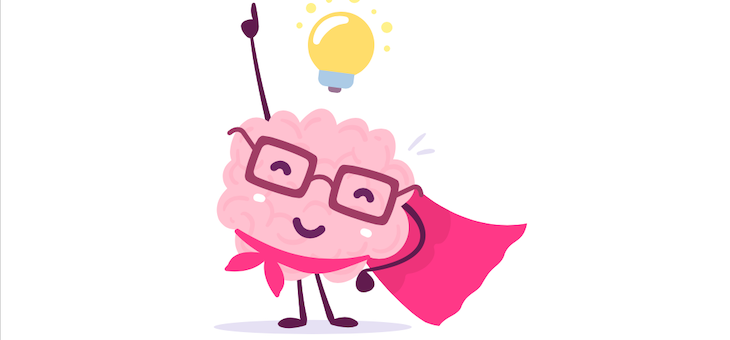Bruce Manners has been a commercial fisherman, a pastor and a magazine editor. He’s now retired. For him that means writing (books and articles), running retirenotes.com and continuing to research the keys to healthy ageing.
•••
Yes, your brain is communicating to you all the time, but the problem is that you control your brain’s thinking. So, how can your brain tell you anything?
I started asking myself this when my son gave me a birthday present – a copy of Timothy R Jennings’ The Aging Brain.
Thanks son. Sincerely. I feel the love.
Here are the five things your brain wants you to know.
1. ‘A healthy brain requires a healthy body’
That’s a quote from The Aging Brain. And it makes sense because if the brain isn’t supported by a healthy body that’s pumping a strong flow of blood and oxygen to it, it will falter. A healthy body is dependent on its fuel (food and drink) and its fitness. It’s that simple and that challenging.
Mr Jennings puts the link this way: “Whatever undermines the health of the body will necessarily undermine the health and functioning of the brain.”
A healthy body is important for brain health. That takes good fuel and fitness. Are you up for the challenge?
2. The heart and brain are linked
A healthy heart is essential to a healthy brain. Harvard Health notes that diseases and conditions that clog arteries in the body also clog arteries in the brain. When arterial damage becomes a blockage, it can lead to strokes and vascular dementia.
“More and more research is linking Alzheimer’s dementia to the same risk factors that cause heart disease, strokes, peripheral vascular disease and vascular dementias: obesity; high blood pressure; high cholesterol; and diabetes,” says Harvard Health.
There’s good news, though. Even those with a family history of dementia, who have mild cognitive impairment (forgetfulness, confusion), can still reduce their risk of developing dementia by living a heart-healthy lifestyle.
A heart-healthy lifestyle means (says Harvard Health): a minimum of 150 minutes per week of activity, a plant-based diet with at least five servings of fruits and vegetables a day, avoiding toxic foods such as processed grains (those without fibre), added sugars, sodium and saturated fats; avoiding or quitting smoking, and limiting (or quitting) alcohol.
3. Use it or lose it is a reality
I came across a study of an elderly chess player while writing Retirement Ready? Chess was part of his weekly routine. He complained of slight memory loss, which, over two years, progressed to ‘mild cognitive impairment’.
Then he became ill (unrelated to his mental condition) and died a few months later.
An autopsy revealed that his brain had all the signs of advanced Alzheimer’s, but he didn’t act as if the disease was as bad as it was.
Chess is a thinking game and it’s felt that his experience demonstrated the ‘compensatory ability of the brain’ when given this regular cognitive stimulation. Playing chess had compensated for the disease attacking his brain.
Dementia Australia says that “challenging the brain with new activities helps to build new brain cells and strengthen connections between them”. This, in turn, helps to develop more ‘reserve’ or ‘back up’ so the brain can cope, compensate and “keep working properly if any brain cells are damaged or die”.
Learning a language, learning a musical instrument, playing a new sport, studying are the types of things that challenge the brain.
4. Give your brain a break
Sleep is important for your brain. Research shows that during sleep, ‘the brain clears out toxins called beta-amyloids that can lead to Alzheimer’s and other forms of dementia’.
A key way to keep your brain working is to shut it off for seven to nine hours a night. Neurologist and integrative medicine specialist Romie Mushtaq says: “Sleep is the most important thing you can do to reset the brain, allow it to heal and to restore mental health.”
Darren Morton, in Living More Happy, adds: “Sleep is so important for our health and wellbeing that we can’t afford not to make it a priority. If you struggle to get enough sleep, take measures to remedy it.” You’ll find his suggested remedies here.
5. People are good for your brain
“Spending time with friends and family, or people whose company you enjoy, in ways that interest you, is good for our brain health,” says Dementia Australia. These associations help to build new brain cells and strengthen the connections between them. This “can protect you against dementia”.
And if you can combine social interaction with physical activity, that’s even better.
“Strong social ties have been associated with a lower risk of dementia, as well as lower blood pressure and longer life expectancy,” adds Harvard Health.
Your brain would appreciate you working on these five areas. Actually, that means you will appreciate it, too.
Are you doing the best you can to ensure your brain is in tip-top shape?
Bruce Manners is the author of Retirement Ready? and Refusing to Retire. He is also the founder of RetireNotes.com
If you enjoy our content, don’t keep it to yourself. Share our free eNews with your friends and encourage them to sign up.
Related articles:
The ‘killer’ in imported products
Are we the binge-drinking boomers?
How old is old?

